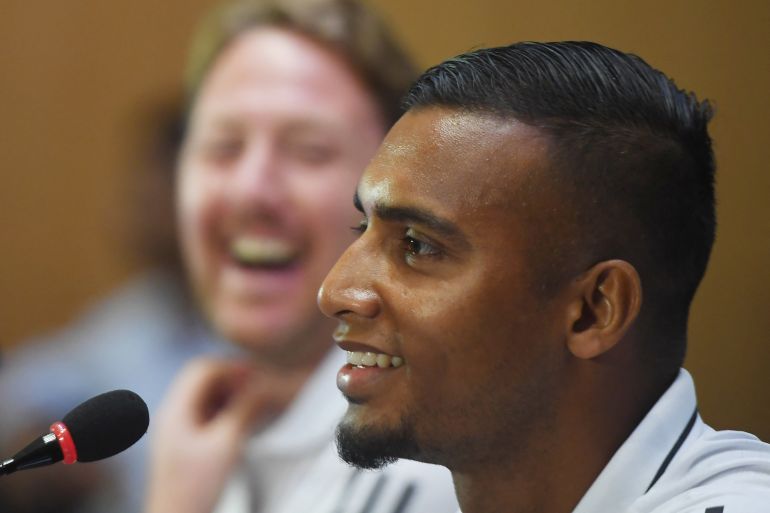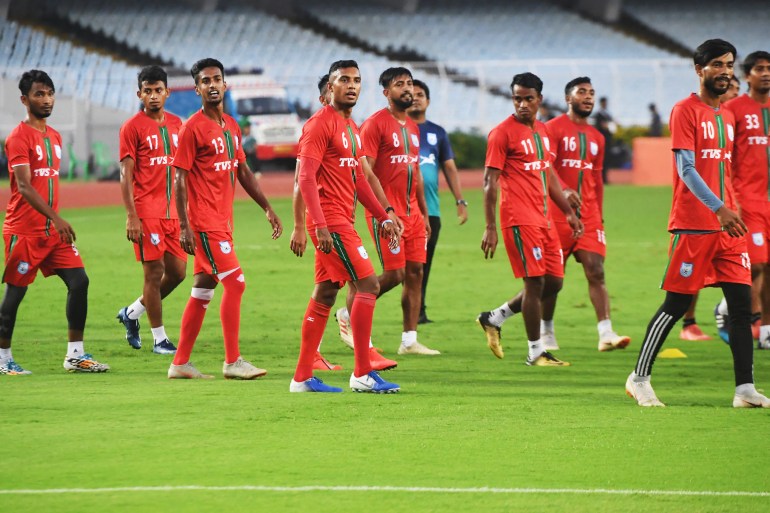From a coma to captaining Bangladesh: Jamal Bhuyan’s football journey
Bhuyan talks to Al Jazeera about his rise to stardom in Bangladesh, his move to Argentina, and upcoming World Cup qualifiers.

As 16-year-old Jamal Bhuyan woke from a coma, in his mind, it was still Friday, November 17, 2006. He had a game on Saturday for FC Copenhagen’s youth team and needed to tell the coach that he wouldn’t be available.
Rather than passing him the phone, the nurse handed him a newspaper. It was now Sunday, and splashed across the pages of the paper was none other than Bhuyan himself.
Keep reading
list of 4 items‘Bring Hersh Home’: Football club waits for Israeli ‘leftie’, Hamas captive
‘Many players have died’: Israel’s war on Gaza hits Palestinian football
Saudi Arabia set to host 2034 FIFA World Cup as Australia drops out
“She said, ‘You got shot two days ago. Don’t worry, everybody knows that you’re here,’” he recalled.
Bhuyan was shot four times, one bullet narrowly missing his heart, after he was caught in the crossfire of gang-related gunfire in the suburbs of the Danish capital. He was lucky to still be alive.
Then a promising footballer in the youth side of one of Denmark’s biggest clubs and on the verge of breaking into the senior team, that fateful Friday afternoon stopped his fledgling career in its tracks.
He spent four lonely months in hospital during an arduous recovery process.
“The doctors told me: ‘You’re not going to play football ever again,'” the now 33-year-old told Al Jazeera in an online interview.
Despite undergoing 12 surgeries and still suffering from the effects of the shooting – he has limited feeling and movement in his right hand – being a footballer was his dream and he refused to walk away.
Known as a tough defensive midfielder, before moving into a more attacking role more recently, Bhuyan has gone on to become Bangladesh’s record appearance-maker, with more than 75 caps since his international debut in 2013, and became captain in 2018.
Jamie Day, his former national team coach, told Al Jazeera that Bhuyan’s achievements are remarkable, especially given his experiences and background.
“I think that shows the character and the type of person that he is, he’s a fighter,” Day said.
“He’s shown in life that you have to battle. But if you do that and you’re fully focused, and there’s determination and drive that you can achieve anything you want.”
A new path
Bhuyan grew up in Brondby Nord, a rough neighbourhood in the outer suburbs of the Danish capital, with his parents, both migrants from Bangladesh, and two older brothers.
It was these roots that formed the foundations for his new career, one based in Dhaka rather than Denmark.
Although he defied the odds to return to the football pitch, he had to start over in the lower levels of Danish football, before he received an offer to join Abahani Limited Dhaka, one of Bangladesh’s biggest clubs, in 2012.
Fast forward to 2023 and Bhuyan is now one of the country’s most recognisable sports stars.
“Jamal is arguably the most popular [Bangladeshi] footballer of his generation,” Dhaka-based journalist Atique Anam said.
“His presentability, upbringing, stories of his time in Denmark, his communication skills and experience make him the ideal marketable product in football, which otherwise suffers from a lack of interest from sponsors.
“Jamal was the first footballer in the national team who grew up outside the country. He had difficulties coping with the culture here initially, but over the last 10 years, he got settled and evolved as the leader.”

Life in Dhaka, one of the world’s most densely populated cities, can be suffocating at the best of times. When you’re one of the country’s most popular athletes, that suffocation can be overwhelming.
“After I became captain, the whole scenario changed for me,” Bhuyan said.
“What I was used to, to go out and be myself, I didn’t have that freedom any more, especially in Dhaka. When I go outside in Dhaka people knock on the car, they will do anything. They will wait for me in front of the hotel.
“You know, I came from nothing, and suddenly I became very, very well-known in my own country. So, for me, it was a big change.
“And of course when you’re the captain of the football team, you’re like the face of football in Bangladesh. So wherever I go, I get recognised and for me it’s positive and it’s nice, but sometimes it can also kill your freedom to go places.”
Leading by example
Despite the attention, Day said being the face and leader of Bangladesh comes easily to Bhuyan.
“He’s a good leader, he obviously leads by example,” Day, who coached Bangladesh between 2018 and 2022, said. “But he will let other players know if they’re not pulling their weight.
“He is very approachable for the players. He’s easy to talk to and get on with, but he does expect high standards from everyone on and off the pitch.”
Bangladesh are currently ranked 183rd in the official FIFA rankings, and while football is popular, it is a distant second to cricket.
Bhuyan believes Bangladeshi football is now focusing its development efforts in the right areas – building more facilities like stadiums and training pitches, and developing the grassroots game.
“Still, we have a long way to go, but we are on a good track right now compared to five or six years ago,” he said.
Not content with being just the national team captain, Bhuyan is now something of an unofficial ambassador for his country in Argentina thanks to his historic move to Club Sol de Mayo in the third tier of Argentinian football in August, when he became the first Bangladeshi player to sign for an Argentinian club.
The Bangladeshi love affair with Argentinian football dates back to 1986, before Bhuyan was even born, when the South Asian country became transfixed by Diego Maradona and his World Cup-winning performances for La Albiceleste.
Bangladesh’s fanatical support for Argentina came to prominence again during last year’s World Cup in Qatar and led to Argentina reopening its embassy in Dhaka, which had been closed since 1978.
Bhuyan was present at the reopening ceremony, exchanging jerseys with Santiago Cafiero, Argentina’s foreign minister. After moving to Argentina, he was also afforded a meeting with Chiqui Tapia, the president of the Argentina Football Association.
“I remember when I landed in Buenos Aires, there were around 200 Bangladeshis at the airport with big banners and flags,” he said.
“I think that the club president was so surprised and overwhelmed about it because I don’t think he realised that he would be able to get so much attention.
“Even to my first match, it was full of Bengali people. I think 80 percent of the crowd was from Bangladesh. So I was very honoured and very proud.
“I even know that the club used to play in white and blue coloured jerseys, but because of me, they changed the colour to green. So that’s crazy.”
Pressure? What pressure?
As much as it comes with challenges, don’t ask Bhuyan as to whether his status as a leader comes with any extra pressure.
“I don’t know about the word pressure,” he said.
“Those who have pressure in life are those people who don’t have food on the table … there’s a lot of poor people in Bangladesh that I’ve seen with my own eyes. They don’t have food, they don’t have money. So I think those kinds of people have pressure.
“I feel a responsibility to perform well and a responsibility to lead my team and to do my best for my team.”
The responsibility of leading his country continues this week as Bangladesh resume their dual qualification process for the 2026 FIFA World Cup and 2027 AFC Asian Cup.
As one of Asia’s lowest-ranked teams, their journey started last month with a narrow 3-2 aggregate victory over the Maldives.
World Cup qualifiers ! #WC #JB6 pic.twitter.com/LPrnSJqK1O
— Jamal Bhuyan (@Jamal_Bhuyan) October 18, 2023
Even with an expanded World Cup on the horizon, Bhuyan knows qualifying isn’t realistic. Even qualifying for the Asian Cup would be a stunning achievement. Instead, their targets are somewhat smaller.
“I think the main goal is to be able to compete with teams who are much higher ranked than us and to give good performances,” he said from Melbourne where the Bengal Tigers will face Australia on Thursday evening in the opener for a tough qualifying group that also includes Lebanon and Palestine.
“Of course, if we are able to steal some points and maybe get a win or two, then for us, it will be brilliant.”